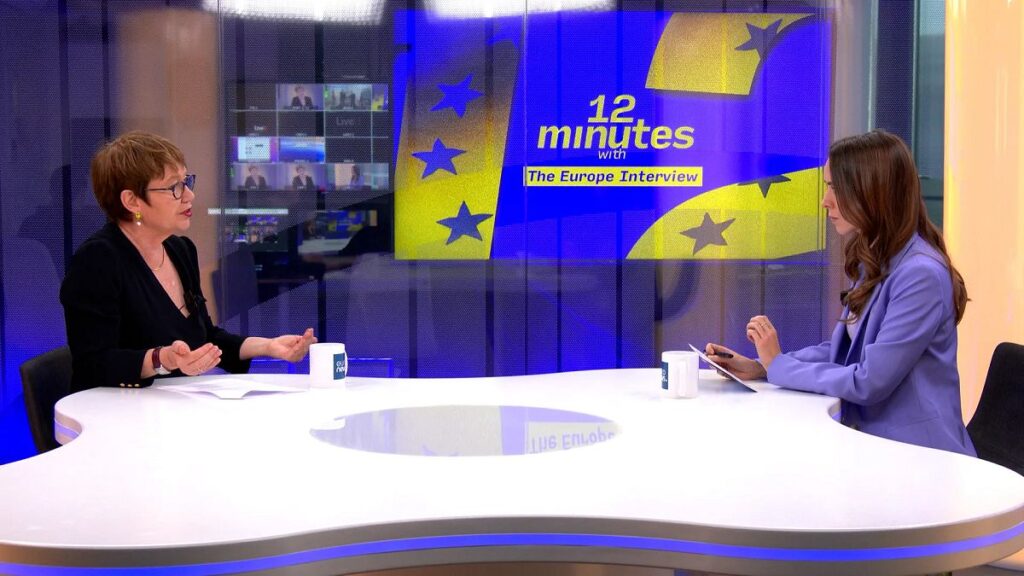The London-headquartered European Bank for Reconstruction and Development (EBRD) has an “even more important” role to play in a global context of geopolitical and economic instability, its president Odile Renaud-Basso has told Euronews in an interview.
Established in the aftermath of the Cold War primarily to invest in post-Soviet economies, today the bank invests in Eastern Europe, Asia and North Africa, and is owned by the European Union, the European Investment Bank (EIB) and 77 governments, including the United States and China.
The institution, in recent years, found renewed purpose by becoming Ukraine’s largest institutional investor, deploying €8.3 billion in investments to the country since Russia’s full-scale invasion started in February 2022.
Asked whether the rise of protectionism and Western governments’ sweeping cuts to foreign aid were undermining the bank’s mission, Renaud-Basso said: “I think that the role of multilateral institutions like the EBRD is even more important, because we, with the support of our shareholders, including the US, are very much focusing on how we can develop market economies (…) create jobs for people and have a positive impact on growth.”
“It also helps [the economies in which we invest] to build up resilience in a context where there are much more trade tensions, geopolitical tensions, building resilience and building the capacity of their economy to generate and diversify your supply chain, which is very important for a country to have sustained growth.”
“So, I don’t think we are under threat; on the contrary, our role is even more important.”
The US remains the bank’s largest shareholder, owning 9.2%, followed by the UK at 8.9%. The European Union and the EIB jointly hold around 6.2% of its ownership.
The Trump administration has broadly frozen foreign aid payments, with support for multilateral development banks also in doubt. The bank has given until the end of the year for the US to subscribe to a capital increase approved by the board in 2023.
Bank ‘ready’ to invest in recovery of Ukraine and Gaza
She added that the bank could play a crucial role in the future recovery of war-torn nations, such as Ukraine and Gaza, by channelling foreign investment into the private sector and helping to revive their post-war economies.
The bank’s current investments in Ukraine are primarily focused on the energy, banking and agrifood sectors.
It is working with Ukraine’s state-run oil and gas company Naftogaz to ensure that the war-torn country has sufficient gas storage to cover the winter, amid a recent sharp uptick in Russian drone and missile attacks on Ukraine’s energy infrastructure.
While the bank cannot provide support directly to the government or fund the military, its capital is crucial in sustaining the country’s private sector and underpinning economic growth.
It recently revised Ukraine’s expected GDP growth for 2025 down to 2.5% from an initial forecast of 3.3% due to “high uncertainty related to the war”.
In the event of a ceasefire and peace settlement, the institution plans to deploy €3 billion in annual investments for Ukraine’s post-war recovery, Renaud-Basso explained.
However, she added that this would largely hinge on a peace deal that gives “clear visibility and certainty that the war will not start again”.
“Ukraine has been at war since 2014, and this is not very conducive to investment and development.”
“We plan to invest at least €3 billion per year [post-war]. We have already put in place, with the support of the EU and in connection with the European Investment Bank, a project preparation facility so that it’s up and running and [investments] can be very quick when the conditions are better,” she said.
Renaud-Basso spoke to Euronews as the first phase of a ceasefire deal brokered with the support of US President Donald Trump to end the two-year war in Gaza came into effect.
She welcomed the breakthrough as “positive” and “encouraging”, adding that the bank could replicate its current investments in the West Bank’s private sector once the conditions in Gaza are in place.
The World Bank estimates the cost of Gaza’s post-war reconstruction to be around €46 billion.
“We have accelerated our investments in the West Bank. In the last two years, we invested €200 million, which is double the amount of the previous five years,” she said. These investments are channelled to banks, small and medium-sized enterprises (SMEs) and the manufacturing sector.
“Of course, the needs for the construction in Gaza will be huge. We have a private sector focus, so I think our role would be (…) – when circumstances allow – to support financing the private sector in Gaza. The first starting point will be humanitarian and basic infrastructure reconstruction, but we will be ready when it’s possible.”
Watch the full interview, 12 minutes with Odile Renaud-Basso, on Euronews on Tuesday at 8:30 pm CEST.
Read the full article here
